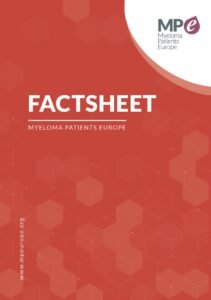What is elotuzumab (Empliciti®)?
Elotuzumab is a monoclonal antibody. It was approved in Europe in 2016 for use in combination with lenalidomide (Revlimid) and dexamethasone (ERd).
Elotuzumab is also indicated in combination with pomalidomide (Imnovid) and dexamethasone for the treatment of adult patients with relapsed and refractory multiple myeloma who have received at least two prior therapies including lenalidomide (Revlimid) and a proteasome inhibitor and have demonstrated disease progression on the last therapy.
As multiple myeloma is considered a ‘rare disease’ because of the small number of patients with this disease, elotuzumab was granted ‘orphan drug designation’* by the European Commission in 2016. An orphan drug designation is a status assigned to medicines developed for rare disease conditions that affect less than 5 patients per 10,000 inhabitants in the EU.
How does elotuzumab work?
Elotuzumab is a monoclonal antibody (a laboratory engineered antibody that mimics human antibodies) that specifically targets the SLAMF7 protein (also known as CS1) which is expressed on the surface of myeloma cells and natural killer cells (NK cells) of the immune system. Elotuzumab has a dual mechanism of action. By binding to the SLAMF7 protein on natural killer cells, this drug activates the immune system. It also targets SLAMF7 on myeloma cells, which tags them for recognition by natural killer cells. When a natural killer cell of the immune system is activated by elotuzamab, the natural killer cell then recognises the already tagged myeloma cell and induces cell death.
What are the benefits of elotuzumab?
A clinical trial, involving 646 patients, evaluated the combination of elotuzumab, lenalidomide, and low-dose dexamethasone as compared to lenalidomide and dexamethasone alone in patients who had received one to three prior therapies and had progressed following their most recent therapy. Patients who took this new combination (elotuzumab, lenalidomide, and low-dose dexamethasone) had a 30% reduction of risk of disease progression or death compared to patients who took only lenalidomide and dexamethasone. Patients receiving a combination treatment lived without their disease worsening for an average of 4.5 months longer than patients taking lenalidomide and dexamethasone alone (19.4 months vs. 14.9 months). These observed benefits were maintained over time. In addition, a higher percentage of patients taking this combination treatment achieved a partial or complete response as compared to those taking lenalidomide and dexamethasone alone (overall response rate of 79% vs. 66%).
How and when is elotuzumab given?
Elotuzumab is available as a powder to be made up into a solution. It is given as an intravenous (IV) infusion (drip) into a vein. The dose is 10 mg/kg of body weight. Treatment takes place in 28-day cycles. It is given along with oral lenalidomide and dexamethasone once a week for the first two cycles and every two weeks after that time. Elotuzumab is given until the disease progresses or if there is unacceptable toxicity.
Patients are required to take the following oral medications to reduce the risk of infusion reaction before receiving elotuzumab:
- anti-inflammatory medicine (dexamethasone)
- antihistamines (e.g. diphenhydramine and ranitidine)
- a fever-reducing agent (e.g. acetaminophen, paracetamol)
What are the side effects?
The most common side effects seen with elotuzumab in combination with lenalidomide and low-dose dexamethasone (which may affect more than 1 in 10 people)1 are infusion reactions (with symptoms such as fever and chills) as well as:
- diarrhoea
- shingles (painful, blistering rash)
- cough
- numbness, weakness, tingling, or burning pain in the arms or legs
- sore throat or runny nose
- upper respiratory tract infection
- decreased appetite
- pneumonia (lung infection)
- colds
- low levels of white blood cells
- weight loss
The majority of side effects are mild or moderate, and the most serious is pneumonia.
Patients should contact their healthcare provider if they experience signs and symptoms of infusion reactions including fever, chills, rash or breathing problems within 24 hours of infusion.
References
- The Multiple Myeloma Research Foundation (MMRF). https://www.themmrf.org/multiple-myeloma-knowledge-center/myeloma-drugs-guide/empliciti-elotuzumab/
- Food and Drug Administration. Approved Drugs. http://www.fda.gov/Drugs/InformationOnDrugs/ApprovedDrugs/ucm474719.htm
- Manufacturer’s product information http://www.empliciti.com/ and http://packageinserts.bms.com/pi/pi_empliciti.pdf
- European Medicines Agency. Empliciti (elotuzumab) European public assessment report (EPAR) – last updated 09/2019: https://www.ema.europa.eu/en/documents/overview/empliciti-epar-medicine-overview_en.pdf
- Lonial S et al. Elotuzumab therapy for relapsed or refractory multiple myeloma. N Engl J Med 2015: 373:621-631.
